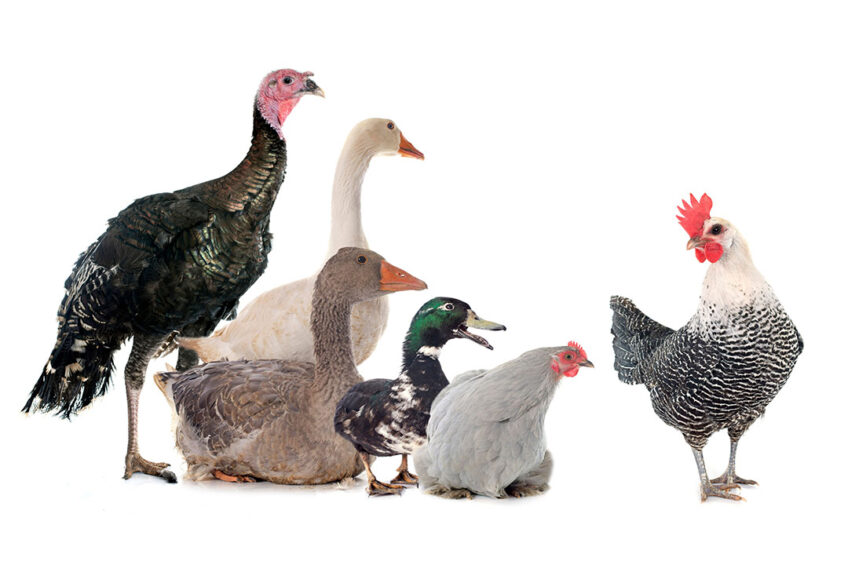Application of phytogenic feed additives in poultry industry

The symbiotic relationship between the gut microbiota and the host determines gut health in poultry, and any disturbance in the gut microbiota can result in an imbalanced host-microbe relationship, also known as dysbiosis.
Alternative solutions to antibiotics
For a long time, antibiotics have been administered to improve health and growth performance in poultry; however, they can negatively impact gut microbiota. Furthermore, the increasing risk of cross resistance of pathogens to antibiotics has led to the gradual removal of antibiotics for therapeutic and prophylactic application in poultry. As a result, research has been focused on the implementation of effective alternative control methods, management, and dietary amendments to improve poultry health, welfare, and productivity. Phytogenic feed additives are one of the alternatives to antibiotics that are used for poultry production at an increasing frequency. This article will discuss the role of phytogenic feed additives as an alternative to antibiotic growth promoters and their impact on nutrient digestibility and their role in maintaining gut health and function through regulation of the gut microbiota in poultry industry.
Gut health and functionality
Optimal digestion and absorption, maintaining fluid and electrolyte balance, eliminating waste products, and preserving a barrier against antigens and pathogens are considered as major gut functions. Several factors including diet, effective digestion and absorption, normal and stable microbiota, effective immune status, gut mucosa, and neuroendocrine and motor function of the gut affect gut health and functionality. Diet composition including ingredients, nutrients, and additives and diet form including structure and particle size impact gut functionality through the modulation of immune system and gut microbiota.
Poultry gut microbiota
Poultry gut is compactly protected by complex microbial communities including bacteria, fungi, archaea, protozoa, and virus which play a vital role in digestion and absorption of nutrients, immune system development and pathogen exclusion for the bird. The microbiota of the distal gut including caeca and colon uses the undigested feed to produce vitamin K and vitamin B groups, amino acids, and short chain fatty acids such as acetic acid, butyric acid, and propionic acid. Gut microbiota is classified as the luminal microbiota and the mucosal microbiota. Nutrients, antimicrobial substances, and the feed passage rate determine the composition of the luminal microbiota and factors such as secretion of immunoglobulins, and mucus production rate affect the composition of the mucosal-attached microbiota.
What are phytogenic feed additives?
Phytogenic feed additives, also referred as phytobiotics or botanicals, are cost-effective feed additives with proven positive effects on poultry growth rate, nutrient digestibility, and gut health. A broad range of plants derived products may fall under the category of phytogenic feed additives. They may be classified either based on their origin into and spices or depending on the process used to derive the active ingredients as essential oils and oleoresins.
An alternative to antibiotic growth promoters
Phytogenic feed additives can be included in feed as dried, solid, and ground form, or as crude, concentrated, and purified extracts to promote growth in poultry production systems. One of the mechanism of actions of phytogenic feed additives is through antimicrobial effects against potential pathogens such as Escherichia coli and Clostridium perfringens, potentially decreasing the risk for the development of colibacillosis and necrotic enteritis. In addition, studies have shown alleviation of coccidiosis symptoms, including reduction in lesion severity and oocyst shedding by phytogenic feed additives. The antimicrobial effects of phytogenic feed additives are related to phenolic components and their action on pathogenic cells. Furthermore, phytogenic feed additives boost nutrient utilisation and growth performance by enhancing production of digestive secretions and enzymatic activity, increasing villus height, decreasing crypt depth, augmenting goblet cell counts, and reducing mucosal thickness.
Effects of phytogenic feed additives on digestibility
Evaluating and improving digestibility is crucial since it directly affects feed efficiency, decreases the amount of undigested feed in the gut, and reduces the risk of inflammation and poorer performance. A study by Hafeez and colleagues (2016) determined that supplementing essential oils and phytogenic compounds increase digestibility of fat and dry matter, and the apparent ileal digestibility of crude protein, phosphorus, and cysteine. In 2020, Abdel-Wareth and colleagues showed that in laying hens, dietary supplementation of peppermint oil increase digestibility of crude proteins and phosphorus from 32 to 44 weeks of age.
A study by Ding and colleagues (2017) described that supplementing essential oils including thymol 13.5% and cinnamaldehyde 4.5% as major active components significantly increase protein and fat digestibility from 54 to 65 weeks of age. In 2015, Gheisar and colleagues concluded that feeding phytogenic blend containing quillaja, anise, and thyme increase nutrient digestibility in ducks and broilers fed high nutrient density diets. The digestion-stimulating properties of the phytogenic feed additives is attributed to piperine, which stimulates digestion and increase absorption of selenium, vitamin B complex, and β carotene. Feed additives to increase nutrient digestibility by stimulating appetite, saliva secretion, gut mucus production, bile acid secretion, and the activity of digestive enzymes such as trypsin and amylase. In addition, these feed additives positively affect the gut morphology, and gut border and they systematically alter macronutrient metabolism.
Effects of phytogenic feed additives on gut microbiota
The supplementation of phytogenic feed additives containing the carvacrol regulates gut microbiota, increases cecal mucosa-associated levels of Bacteroides and Clostridium, and maintains overall gut function. Dietary supplementation of essential oils promotes digestive enzyme activity and improves feed efficiency. Broilers supplemented with essential oils such as carvacrol, thymol, eugenol and piperine have higher number of beneficial bacteria such as Clostridiales and Lactobacillales. In addition, adding thymol and carvacrol to the diet changes the host gut microbial population dynamics by increasing the population of beneficial microbial species that plays a key role in the protection of the host from infection. Broilers receiving a plant extract composed of green tea leaves and pomegranate rinds have greater population of lactic acid bacteria modulates the composition of gut microflora, develops immunity, and improves gut health.
Concluding remarks
With the elimination of antibiotics for therapeutic and prophylactic application in poultry, farmers need to apply a combination of alternative products in conjunction with enhanced management methods, rigorous biosecurity, and effective immunisation programs to meet the health and productivity goals. Phytogenic feed additives have promising effects on growth performance, nutrient digestibility, feed efficiency, and gut health in poultry. Although further research is required to select the active compounds to create potentially effective blends of these feed additives.







